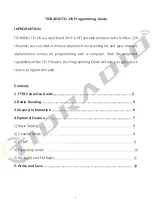
15
14
Introduction
Product Features
Customer Assistance
Operational Cautions
Exposure to high volume sound levels may cause temporary or permanent
damage to your hearing. Although there is no single volume setting that is
appropriate for everyone, you should always use your radio with the volume set
at low level and avoid prolonged exposure to high volume sound levels.
1. Set the volume control in a low position and use as low a volume as
possible.
2. Avoid turning up the volume to block out noisy surroundings. Whenever
possble, use your radio in a quiet environment with low background noise.
3. Limit the amount of time you use headsets or earpiece at high volume
levels.
4. When using the radio without a headset or earpiece, do not place the radio’s
speaker directly against your ear.
5. Observe all signs and instructions that require an electrical device or RF
radio product to be switched off in designated areas, such as gas/refueling
stations, hospitals, blasting areas, potentially explosive atmospheres, or
aircraft.
6. If you experience a skin irritation after using this product, discontinue use
and seek medical attention.
7. If the product or charger: overheats; has a damaged cord or plug; has been
dropped or damaged; has been dropped into water, disconnect any charger
from its power supply, discontinue use of the product.
Electromagnetic Interference
Nearly every electronic device is susceptible to electromagnetic interference
(EMI) if inadequately shielded, designed, or otherwise configured for
electromagnetic compatibility. Turn off your radio in any facility where posted
notices instruct you to do so. These facilities may include hospitals or health
care facilities that may be using equipment that is sensitive to external RF
energy.
•
When instructed to do so, turn off your radios when on board an aircraft. Any
use of a RF device must be in accordance with applicable laws, regulations
and airline crew instructions.
•
Some radios may interfere with some hearing aids. In the event of such
interference, you may want to consult your hearing aid manufacturer or
physician to discuss alternatives.
•
If you use any other personal medical device, consult the manufacturer of
your deivce to determine if it is adequately shielded from RF energy. Your
doctor or physician may be able to assist you in obtaining this information.
A-3
A-4
12
13
1
9
8
6
5
2
3
10
4
11 7
1. Antenna
2.
Up
Button
3.
Down
Button
4. Microphone
5.
Call/Lock
Button
6. USB Charge Jack
7. Battery Door Screws
8. Speaker
9.
Mode
Button
10. Backlit LCD Display
11.
Talk
Button
12. Power On/Off/Volume Knob
13. External Speaker /
Microphone Jack
14. Holster with 360˚ Swivel Clip
15. Battery compartment
Содержание DXFRS300
Страница 12: ...Notes 17 18 ...






























